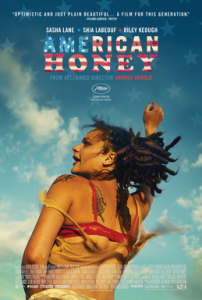film review: american honey

We found love in a hopeless place. It’s a familiar refrain for the millennial generation, and one that provides the soundtrack to key moments in Andrea Arnold’s latest film, American Honey. Rihanna’s We Found Love is the perfect music to capture the heart of this film, a winner of the Jury Prize at The Cannes Film Festival that is bleak and sentimental in equal measure. At the centre of it all is Star (Sasha Lane), an unforgettable character who is searching for a better life.
When the film opens, Star is living with her abusive father and caring for two younger siblings, making what little money she has go as far as it can. On a trip to Kmart she meets the enchanting Jake (Shia LaBeouf) and his crew of travelling magazine sellers. Star is immediately taken with Jake and the crew’s seemingly carefree lifestyle. She leaves her siblings with their mother (as we learn later in the film, her own mother has passed away) and goes out on the road with the crew the very next day.
The film is loosely based on real magazine crews in the United States, which filmmaker Arnold had read about in the New York Times. It follows Star and the magazine sellers through big cities, wealthy suburbs, and even oilfields as they do almost anything to sell subscriptions to print magazines – which, as is often pointed out in the film, are not an easy thing to sell in the twenty-first century. They travel crammed into a van, sleep in cheap motels, and hand over their daily earnings to boss Krystal (Riley Keough), who runs a regular “Loser Night” where the lowest-earners fight each other for the entertainment of the group. It’s a life of drinking, drugs, and different kinds of exploitation, yet Star finds something in the experience that she hadn’t had before: a sense of self.
She also finds love, or at least something like it for a while, with Jake – much to the annoyance of Krystal. At first Jake takes care of Star, but his magnetic personality soon turns possessive and then dismissive. It’s hard to say exactly how their relationship ends up, as there is a lot in this film that remains ambiguous. Perhaps more important than the film’s individual plot points are its overall themes, especially its comment on the class divide in contemporary America. When the crew sell magazines in a wealthy suburb, the contrast between those who sell magazines and those who might have the money to buy them is stark. The film also explores what it means to be young person without a traditional support network, and to be a young woman on the road.
American Honey is kind to its characters, even where it exposes their flaws. Star is ultimately treated poorly by Jake, but the film doesn’t judge her for falling for him. Krystal, in particular, is quite a fascinating character. She uses her sexuality as a source of power, and encourages her sellers to do the same. She is often cruel to her employees, yet the audience is not invited to dislike her, but simply understand her.
Most of the film’s cast, including its lead Sasha Lane, were recruited via what writer and director Andrea Arnold described to Film Ink as ‘street casting’ – approaching regular people on beaches and in carparks instead of looking for professional actors. Lane is wonderfully endearing as Star, and more than holds her own with LaBeouf and Keough. It is hard to believe she hasn’t trained as an actor, yet perhaps that’s what makes her performance feel so authentic.
Throughout, the film has two very distinct modes. One is loud, fast-paced, and chaotic: the crew’s party scenes in particular are flashes of noise and colour, set to a soundtrack of music like Ludacris and Ciara’s Ride. The second mode is quieter, more reflective, and sometimes bittersweet. This is the mode that sees Star have an uncomfortable yet revealing conversation with a truck driver while Dream Baby Dream by Bruce Springsteen plays in the background, and where the crew sing along to the film’s titular song by Lady Antebellum in a scene reminiscent of Almost Famous. It is in these poignant moments that the film wears its heart on its sleeve.
At 163 minutes, the film is a long one, and it really begins to drag towards the end. The party and travel scenes start to feel superfluous, and for some viewers the symbolic ending may not offer sufficient pay off for sticking with the story for so long. For me, the moments of raw emotion within the film, and Lane’s performance especially, made it all worth it.

